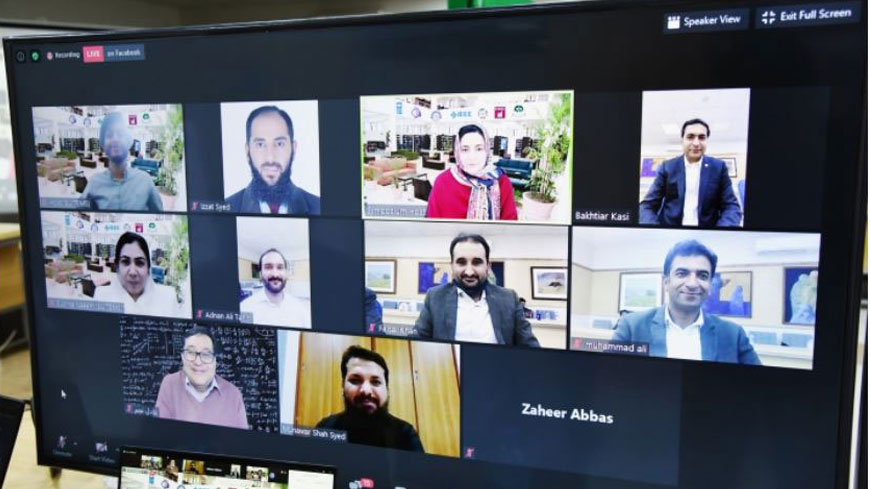 On October 27, 2020 BUIETMS in partnership with United Nations Academic Impact (UNAI)
organized the 1st International Symposium on Building Economic Resilience against
Pandemics. The event was conducted in partnership with the UNDP, Govenment of Balochistan,
IEEE Quetta Sub section and IEEE Women in engineering, Karachi Section. The Virtual
symposium was aimed at inaugurating dialogue on building economic resilience against
pandemics. There were 12 research papers presented along with 3 keynote speakers
Dr. Joachim Von Braun from Germany, Dr. Adil Najam from United States of America and
Dr. Aqdas Afzal Pakistan. Live participation from academia, social sector and international
organizations reached above 100 on Zoom platform. The event was live streamed on Facebook,
where a number of people was reached. So far, 4,400 individuals have accessed the symposium
video on Facebook; where the event details have reached 12,504 individuals.
On October 27, 2020 BUIETMS in partnership with United Nations Academic Impact (UNAI)
organized the 1st International Symposium on Building Economic Resilience against
Pandemics. The event was conducted in partnership with the UNDP, Govenment of Balochistan,
IEEE Quetta Sub section and IEEE Women in engineering, Karachi Section. The Virtual
symposium was aimed at inaugurating dialogue on building economic resilience against
pandemics. There were 12 research papers presented along with 3 keynote speakers
Dr. Joachim Von Braun from Germany, Dr. Adil Najam from United States of America and
Dr. Aqdas Afzal Pakistan. Live participation from academia, social sector and international
organizations reached above 100 on Zoom platform. The event was live streamed on Facebook,
where a number of people was reached. So far, 4,400 individuals have accessed the symposium
video on Facebook; where the event details have reached 12,504 individuals.
Welcome addresses emphasizing on importance of academic dialogue on economic resilience
against pandemics were given by BUITEMS, UNAI and UNDP, representatives. Pro-Vice
Chancellor BUITEMS, Dr. Faisal Khan encouraged cooperation amongst local, national and
international organizations and emphasized global solidarity and cooperation against
COVID-19. Team Lead UNDP Balochistan Sub-office, Mr. Zulfiqar Durrani shared UNDP's
engagements in Balochistan and emphasized on institutional partnerships for the achievement
of SDGs under the lenses of lessons learned from MDGs. Finally, Public Information Officer,
UNAI Mr. Hernandez highlighted the importance of economic resilience against COVID-19 and
highlighted the importance of sustainability and the role of students.
 The keynote speakers focused on Post COVID 19 world: technology, economy and the state;
How to build economic resilience against pandemics, and Understanding the world after
corona virus. Program Director, Social Development and Policy Habib University, Dr. Aqdas
Afzal, talked about pandemic in general; its impact on Pakistan's economy; role of technology;
and COVID-19 and the World Economic Order. Dr. Afzal noted that the pandemic has an
urgency of its own and has affected the global supply chain and the demand—eventually
pushing global economy into recession. Further, Dr. Afzal highlighted that if Pakistan debts are
not written off as suggested by Prime Minister Imran Khan—Pakistan may hit debt trap; mainly
due to decrease in remittances. Furthermore, Dr. Afzal highlighted that Pakistan
communication infrastructure remains thin and economic and social bouncing back requires
investment in Infrastructure. Finally, Dr. Afzal concluded that Pakistan cannot become an
economic powerhouse until we compete in education and improve the quality and quantity of
education in Pakistan.
The keynote speakers focused on Post COVID 19 world: technology, economy and the state;
How to build economic resilience against pandemics, and Understanding the world after
corona virus. Program Director, Social Development and Policy Habib University, Dr. Aqdas
Afzal, talked about pandemic in general; its impact on Pakistan's economy; role of technology;
and COVID-19 and the World Economic Order. Dr. Afzal noted that the pandemic has an
urgency of its own and has affected the global supply chain and the demand—eventually
pushing global economy into recession. Further, Dr. Afzal highlighted that if Pakistan debts are
not written off as suggested by Prime Minister Imran Khan—Pakistan may hit debt trap; mainly
due to decrease in remittances. Furthermore, Dr. Afzal highlighted that Pakistan
communication infrastructure remains thin and economic and social bouncing back requires
investment in Infrastructure. Finally, Dr. Afzal concluded that Pakistan cannot become an
economic powerhouse until we compete in education and improve the quality and quantity of
education in Pakistan.
The 1st Symposium presented 12 research papers themed around 4 specific areas. First,
wages and labor remuneration amid pandemics, fiscal stability and Economic zoning for
sustainable development of Balochistan. Second, Monetary and fiscal intervention, parallel
economy— Balochistan economy and the impacts of PM Ehsaas Programs. Third, Balochistan
economy,economic zoning of Balochistan for sustainable development and impacts of
lockdowns on decent work. Four, Health & labor productivity amid economic crisis, parallel
economy, wages and labor remuneration and monetary and fiscal policy interventions. The
sessions were chaired by Dr. Manzoor Ahmed, Dr. Abidullah, Dr. Muhammad Jamil and
Dr. Zaheer Abbas, respectively. In the end, Dean Faculty of Management Sciences BUITEMS,
Dr. Syed Munawar Shah closed the symposium—thanking all partners, keynote speakers,
presenters and participants. The book of abstract of presented research papers is appended
in the following section.